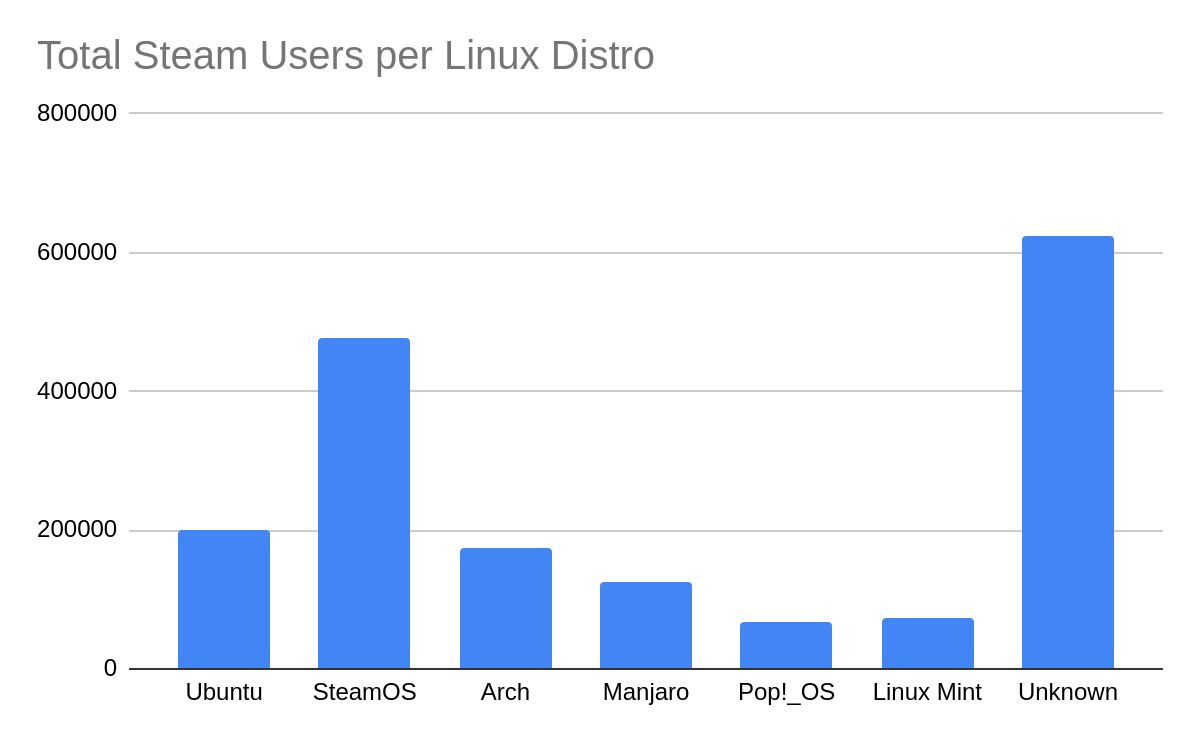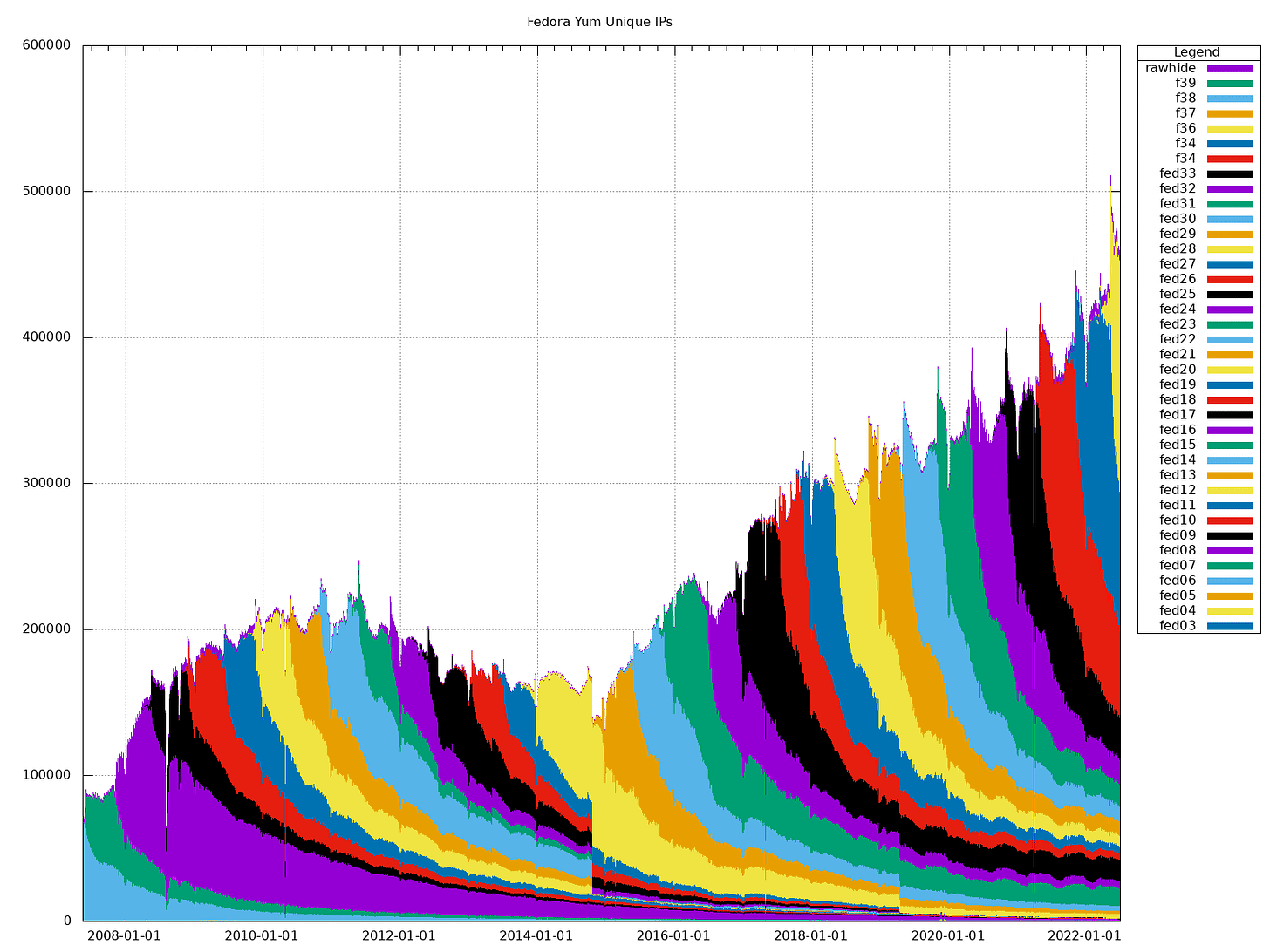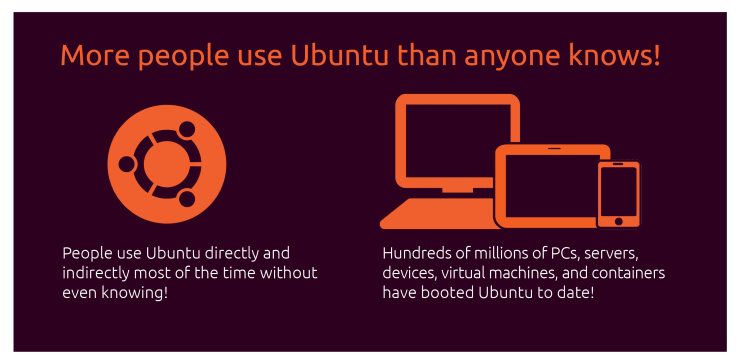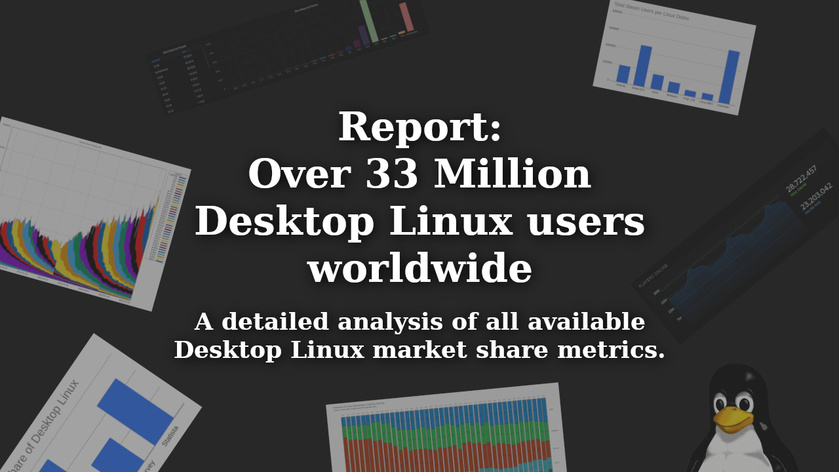Measuring the market share of Linux has been an elusive goal since the beginning of Linux itself — with most attempts at understanding the total number of Linux users based on nothing more than “Star maths and wishy thinking.”
There are three core questions which we seek to answer:
What is the actual market share of Desktop Linux, when compared to other Operating Systems?
How many active Desktop Linux users are there (not as a percentage… but real numbers)?
How many active users are there for each Linux Distribution?
Let’s set out to solve each of those as accurately as possible.
Spoiler: We answer the first two questions with some authority, but the third question remains… murky.
What type of Linux are we measuring?
When we’re talking about Linux Marketshare, the first thing we need to do is define what we mean by Linux.
Linux on servers? On desktops? On mobile phones (like Android)? Does ChromeOS (which is based on Linux) count?
Since we’re attempting to answer a long-standing question about the size of the current Linux user-base, let’s keep things laser focused on simply “Desktop or Laptop computers running a standard Linux distribution.”
No servers. No mobile phones. No ChromeOS.
What is the Linux Market share?
When measuring the percentage market share of Linux, there are two key methods available to us (that both have their advantages and disadvantages).
Measuring web browser usage across a number of high traffic websites.
The advantage here is that we have a large sample size to pull our data from — all users of web browsers on desktop style computers (read: laptops and desktops). This means we are including users of all kinds.
The disadvantage is that this only counts people who have their systems online — luckily, in 2022, that can be safely assumed to be most systems used by most people.
Measuring based on usage of key applications or digital software stores.
A good example of this method is the monthly “Steam Survey.” This allows us to see details of how many people — who actively use the Steam game store — use various Linux distributions.
This is great as it provides far more details… but also gives us a far, far smaller sample size (read: people who are actively using their Linux desktop PC to play games using the Steam store).
Let’s use multiple options to give us the largest amount of data possible:
Statcounter and Statista (which both provide measurements based on web browser usage)
and the Steam Survey

Those put Desktop Linux market share at the following levels:
Statcounter: 2.77%
Steam Survey: 1.44%
Statista: 2.42%
While there have been many measurements over the last two years that have shown a spike in market share… those spikes have tended to be temporary blips. Which suggests they were simply erroneous measurements or temporary changes.
And, while the available stats do tend to change from month to month, the stats have been in the ranges shown above — consistently — for many months.
Based on all available data, the following things are safe to assume:
Linux market share among Steam users is hovering around 1.4%.
Linux market share among web browser users is between 2.4% and 2.8%.
Now comes the tricky part…
How many Linux users exist?
Now that we have a market share range (with a small variance), we need to figure out how many people that actually is.
Let’s start with figuring this out for Steam Users (as we have far more detailed stats on that).

During peak hours there are around 28 Million people online, actively using Steam — with a total Monthly Active User count of roughly 132 Million.
We know that 1.4% of those people are using Linux.
In other words…
There are roughly 1,848,000 people who use Linux, every month, to play games on Steam.
Now, let’s move over to the Web Browser based statistics.
Statista puts the total number of desktop (or laptop) computers in use, in the USA, at around 61.76 Million.
But, of course, that’s just the USA. We need world-wide stats.
Gartner currently counts the Worldwide total install base of Desktop PCs at 470 Million and Laptop PCs at 929 Million.
That’s a grand total of 1.399 Billion PCs (Desktops or Laptops) currently in use (in some capacity) around the world.
Which means, considering the 2.4% and 2.8% range, the total Linux desktop user base is between…
33.57 Million and 39.17 Million. World-wide.
Or, at least that’s how many Desktop Linux installations exist. Even if you consider that many Linux users may have multiple Desktop Linux installations in use at any one time… that is…
Not too shabby!
How many users does each Linux Distribution have?
Now, let’s break this down further. Let’s figure out how many people use each Linux distribution.
This is the really tricky part.
The reality is, there is no consistent way that all major Linux distributions use to measure usage — and not all distribution makers publish such statistics at all.
Luckily, things are a little easier when talking about Steam users… as Steam publishes those details. Let’s tackle that first.

Ubuntu: 201,247
SteamOS: 476,229
Arch: 173,157
Manjaro: 124,185
Pop!_OS: 68,560
Linux Mint: 72,072
Unknown Linux Distribution: 624,808
Now. Here’s a little gotcha.
Those SteamOS users listed above? Nearly 100% of those (based on hardware stats listed on Steam) are not actually Desktop Linux users… they are using the Steam Deck handheld (which has internals similar to a laptop and reports as such within Steam).
Thus… If we are sticking to strictly Desktops and Laptops, we need to remove those device counts from our Steam total.
Meaning there are not actually 1,848,000 Desktop Linux machines running Steam every month (as we previously discovered). That number, in reality, is 1,371,771.
Based on this Steam data, we also know that there are at least 201,247 Ubuntu users, and 173,157 Arch users, that play games on Steam.
But what about that global number of 33.57 Million to 39.17 Million Linux desktops? How does that break down for each Linux Distribution?
We’re going to need to break down each Distro individually, as each handles measurements in different ways.
openSUSE
Disclaimer: This author used to hold an elected position on the openSUSE Board… but has not had any involvement with openSUSE for a number of years.
openSUSE, one of the oldest Linux distributions, is one of the easiest to measure at it measures connections to their software update repository server.
This is made as accurate as possible by creating a unique (but anonymous) identifier which the package manager includes in the server logs. By doing this openSUSE is able to see roughly how many active installations they have for every individual version of the operating system.

In order to get the most accurate look at how many active users of openSUSE there currently are, we are looking at the total number of unique machines that have used those update servers over the last 90 days.
We’ll also combine together all versions of openSUSE. Old versions and new.
The result?
There are 234,434 active installations of openSUSE. Which works out to roughly 0.7% of the total Linux install-base.
Now, the problem here is that this counts all of the ways openSUSE might be used. As a Desktop or as a Server. Or even an embedded device. But getting this number helps get us closer. We at least have a ballpark to work with.
Fedora
The Fedora Project also provides some valuable statistics — somewhat similar to how openSUSE handles things.

As of the beginning of 2022, based on this method of counting, there were roughly 480,000 installations of Fedora in total. Or, put another way, 1.43% of all Desktop Linux systems.
Again, like openSUSE, this include all uses of Fedora… including as a server.
Ubuntu
Measuring Ubuntu is much trickier, as the company behind Ubuntu (Canonical) likes to keep things close to their chest. Sneaky, sneaky.
Back in 2016, the Ubuntu team posted their most recent public data. In it they stated the following:

“More people use Ubuntu than anyone knows!” says Ubuntu.
That line makes me chuckle. Because we certainly don’t know how many people use Ubuntu. And… maybe they don’t either.
“Hundreds of millions of PCs, servers, devices, virtual machines, and containers.”
Whew! That’s a big number.
But it also includes every type of Ubuntu installation smashed together (not just Desktop). And it is incredibly vague. Is it 200 million? 500 million? Who knows! Canonical doesn’t want that number public, it seems.
Or, perhaps, they truly don’t know. Which is entirely possible considering the vast number of ways folks can obtain, install, and update a Linux system.
Since we can’t get any hard numbers from the Ubuntu team, let’s come at this from another direction.
Measuring the Gamers
Many sources claim that Ubuntu has between 30% and 43% of the overall Linux Desktop market.
However, The Lunduke Journal (and others) have noted a dramatic drop, over the last 2 to 3 years, in Ubuntu market share among those who play video games on their Linux Desktop.

Note that, in the most recent numbers, Ubuntu is clocking in at 15.5%. That number is nearly identical to the percentage we got from Steam (15.9%) — after we remove the SteamDeck hardware numbers which were throwing us off initially.
Other items in this chart don’t line up quite as well with Steam, however. Arch, for example, here shows over 22%. Whereas in Steam the number 13.7%.
But, since we actually have two data sources that line up for Ubuntu — and are both based on actual measured data — let’s plug that percentage in and see where that puts us.
As it turns out, that would put Ubuntu as having (give or take) roughly 5,337,630 desktop users.
Mint, Arch, and the rest…
In fact… we need to rely on those same stats to flesh out numbers for most of the remaining major distributions.
Mint Linux claims “Millions” but does not provide any additional details whatsoever. Arch Linux does no tracking of any kind.
That said, using the numbers from the above chart (which does have at least some basis in reality), results in these installation numbers:
Mint: 2,517,750
Manjaro: 5,975,460
Debian: 1,342,800
Pop!_OS: 3,826,980
Arch: 7,620,390
Ubuntu: 5,337,630
The Distro numbers remain… a Mess
Let’s be honest. Those Distro-specific numbers are fuzzy, at best.
Even the Fedora and openSUSE usage statistics — which we have hard data on — are difficult to speak with certainty on as we can’t discern what percentage are Desktop, Server, or otherwise.
For example, if we use the same methodology above to discern the number of Desktop Fedora installations, the number comes out to 2,047,770 — nearly four times what we know the total install base of Fedora to actually be!
Are the rest of the Linux Distribution numbers above inflated? Deflated? Spot on? Without more information from Linux Distribution makers, it is nearly impossible to know.
What we actually know
That said, there are a number of things we can point to with relative certainty.
There are 1,371,771 Desktop Linux users that actively play games using Steam.
There are between 33.57 Million and 39.17 Million Desktop or Laptop PCs, with Linux installed, in active usage. World wide.
There are roughly 480,000 installations of Fedora and 234,434 of openSUSE (of varying types).
Ubuntu is currently the most popular (non-SteamDeck) Linux distribution on Steam. Though only by a slim margin — with Arch right behind it (and the vast majority of Linux distributions on Steam reporting as “Unknown”).
These numbers are as of the end of 2022. It will be interesting to revisit these statistics one year from now to see how they change.















